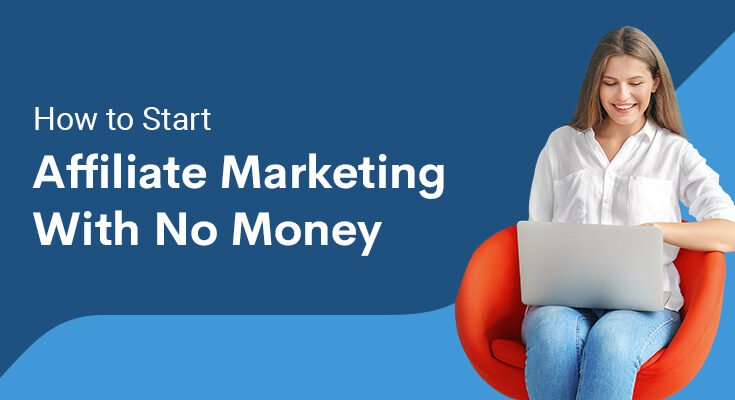Introduction
Affiliate marketing is like the hidden treasure map of the internet. You don’t need a chest full of gold to get started, just a bit of creativity and persistence. Let’s dive into what affiliate marketing is and why starting it with zero budget is totally doable.
What is Affiliate Marketing?
Affiliate marketing is a performance-based marketing strategy where you earn a commission by promoting other people’s (or companies’) products. You find a product you like, promote it to others, and earn a piece of the profit for each sale that you make.
Why Start Affiliate Marketing with No Money?
Starting affiliate marketing with no money is appealing because it removes the barrier of initial investment. This means you can start making money online without spending a dime, leveraging free resources and platforms.
Understanding the Basics of Affiliate Marketing
How Affiliate Marketing Works
Here’s the gist: you join an affiliate program, get a unique affiliate link, and share it with your audience. When someone clicks on your link and makes a purchase, you earn a commission. It’s that simple!
Key Terms in Affiliate Marketing
- Affiliate: The person who promotes the product.
- Merchant: The company that sells the product.
- Commission: The percentage of a sale the affiliate earns.
- Affiliate Link: A unique URL that tracks the affiliate’s sales.
Choosing a Niche
Importance of Selecting a Niche
Choosing a niche is crucial. It helps you target a specific audience, making your marketing efforts more effective. Think of a niche as your little corner of the internet where you can be the expert.
How to Find a Profitable Niche
Look for niches with high demand but low competition. Use tools like Google Trends, keyword planners, and affiliate marketplaces to find a niche that interests you and has potential.
Finding Affiliate Programs
Best Platforms for Affiliate Programs
Several platforms connect affiliates with merchants. Some of the best ones include:
- Amazon Associates
- ShareASale
- ClickBank
- CJ Affiliate
How to Choose the Right Affiliate Program
Look for programs with:
- High commission rates
- Reputable products
- Reliable tracking and payment systems
Building Your Online Presence
Creating a Website or Blog for Free
You don’t need to spend money to create a professional-looking website. Platforms like WordPress.com, Wix, and Blogger offer free versions to get you started.
Utilizing Social Media Platforms
Social media is a powerful tool for affiliate marketers. Platforms like Instagram, Facebook, and Twitter can help you reach a wide audience without spending a cent.
Leveraging Free Blogging Platforms
Use free blogging platforms like Medium and Tumblr to share your content. They have built-in audiences and can help drive traffic to your affiliate links.
Creating Quality Content
Types of Content That Attract Traffic
Content is king! Focus on creating:
- Product Reviews: Honest and detailed reviews that help people make informed decisions.
- How-to Guides: Step-by-step guides that solve a problem or teach something new.
- Listicles: Lists of top products in your niche.
SEO Tips for Affiliate Marketing
SEO, or Search Engine Optimization, helps your content rank higher in search engines. Use keywords naturally, write compelling meta descriptions, and build backlinks to improve your SEO.
Engaging Your Audience
Engage with your audience through comments, social media, and emails. Building a relationship with your audience fosters trust and encourages them to click your affiliate links.
Promoting Affiliate Products
Organic Traffic vs. Paid Traffic
Organic traffic is free and comes from search engines, social media, and other sources. Paid traffic involves paying for ads. For those starting with no money, focusing on organic traffic is the way to go.
Leveraging Email Marketing
Build an email list and send newsletters with valuable content and affiliate links. Free email marketing tools like Mailchimp can help you get started.
Using Social Media for Promotion
Share your content and affiliate links on social media. Join relevant groups and participate in discussions to increase your visibility.
Growing Your Audience
Building an Email List
Offer a freebie, like an ebook or a guide, in exchange for email sign-ups. This helps you build a list of potential customers who are interested in your niche.
Engaging with Your Audience on Social Media
Respond to comments, ask questions, and create polls to keep your audience engaged. The more you interact, the more loyal your audience becomes.
Networking with Other Bloggers and Marketers
Join affiliate marketing communities and forums. Networking with other marketers can provide support, tips, and potential collaboration opportunities.
Monetizing Your Efforts
Tracking Your Affiliate Links
Use tools like Google Analytics and affiliate network dashboards to track your link performance. This helps you understand what’s working and what’s not.
Analyzing Performance and Making Adjustments
Regularly review your analytics and adjust your strategies based on what’s driving traffic and sales. Continuous improvement is key to success.
Scaling Your Affiliate Marketing Business
Once you start seeing success, consider investing in paid traffic or hiring freelancers to help with content creation and promotion.
Common Mistakes to Avoid
Overloading with Ads
Too many ads can overwhelm your audience and make your content seem spammy. Focus on quality over quantity.
Ignoring SEO
SEO is crucial for driving organic traffic. Don’t neglect it!
Not Building Trust with Your Audience
Trust is everything in affiliate marketing. Always promote products you believe in and provide honest reviews.
Tools and Resources
Free Tools for Affiliate Marketers
- Google Analytics: For tracking website traffic.
- Mailchimp: For email marketing.
- Canva: For creating graphics and visuals.
Educational Resources and Communities
Join forums like Warrior Forum or Reddit’s r/AffiliateMarketing. Websites like Smart Passive Income and Neil Patel’s blog offer valuable tips and tutorials.
Success Stories
Case Studies of Successful Affiliate Marketers
Read about people like Pat Flynn and Michelle Schroeder-Gardner who started with little to no money and became successful affiliate marketers.
Lessons Learned from Their Journeys
Common lessons include the importance of persistence, focusing on quality content, and continuously learning and adapting.
Future Trends in Affiliate Marketing
Emerging Trends to Watch
Stay updated with trends like influencer marketing, video content, and AI-driven tools to keep your strategies fresh.
How to Stay Ahead in the Game
Continuously educate yourself, adapt to changes, and always look for new opportunities to grow your affiliate marketing business.
Conclusion
Starting affiliate marketing with no money is not only possible but also exciting and full of opportunities. By following the steps outlined above, you can build a successful affiliate marketing business from scratch. So, what are you waiting for? Dive in and start your affiliate marketing journey today!




